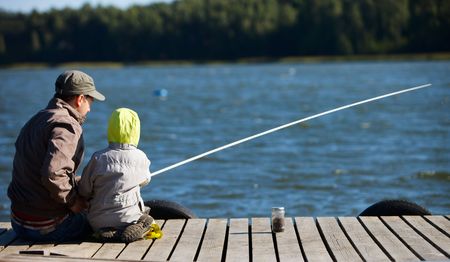Introduction: The Allure of Angling for British Women
In recent years, angling has cast a fresh line into the hearts of women across the UK, transforming what was once seen as a male-dominated pastime into an inclusive and empowering pursuit. For many British women, the riverside is no longer just a picturesque backdrop but an arena for camaraderie, skill-building, and personal triumphs. The rise in female participation reflects more than changing social attitudes; it highlights angling’s unique ability to foster a sense of community while preserving the traditional charm of Britain’s meandering waterways. Whether it’s the gentle murmur of the River Avon at dawn or the tranquil beauty of Yorkshire’s streams, these settings evoke a timeless connection to nature that is deeply woven into British heritage. As more women pick up their rods and reels, they are not only mastering the art of angling but also redefining what it means to belong by the waterside—proving that this cherished sport is as much about friendship and shared experiences as it is about landing the perfect catch.
Casting Off: Getting Started in the British Angling Scene
For many British women, venturing into angling begins with that first cast. Whether you’re drawn to the peaceful banks of the Thames or a bustling match on a Midlands canal, taking your first steps can feel daunting. But fret not—here’s a step-by-step guide to joining local angling clubs, selecting essential kit, and decoding British fishing lingo, designed especially for aspiring female anglers.
Step 1: Joining Your Local Angling Club
Most communities across the UK boast friendly angling societies welcoming newcomers regardless of experience. To get started:
- Research: Use websites like the Angling Trust or social media groups to find clubs near you.
- Visit: Attend an open day or club meeting—many offer taster sessions for novices.
- Sign Up: Complete a simple registration form and pay a modest membership fee (usually £20–£50 per year).
- Get Licensed: Apply for an Environment Agency rod licence online—this is a legal requirement for most freshwater fishing in England and Wales.
Step 2: Understanding Essential Kit
British weather is famously unpredictable, so kitting up properly is vital. Here’s what you’ll need:
| Item | Description |
|---|---|
| Rod & Reel | A basic float or feeder rod is ideal for beginners; match it with a suitable reel. |
| Tackle Box | Includes hooks, floats, weights (shot), and line spools—all tailored to local waters. |
| Bait | Maggots, sweetcorn, or worms are staple choices for UK coarse fishing. |
| Wellies | Sturdy waterproof boots are essential for muddy banks and wet grass. |
| Landing Net | A must-have for safely landing your catch without harming the fish. |
Step 3: Breaking Down Common British Fishing Terms
| Term | Meaning |
|---|---|
| Bivvy | A small tent used during overnight sessions on the bank. |
| Peg | The designated spot assigned to each angler during a contest. |
| Tight lines! | A friendly phrase wishing someone good luck while fishing. |
| Keepsack/Keepnet | A long net kept in the water to temporarily hold fish before weigh-in and release. |
| Tackle shop | Your go-to local store for bait, gear, and advice from seasoned anglers. |
Pro Tip: Practice Makes Perfect!
Before your first match or casual session with friends, practice setting up your rod and tying basic knots at home. Many clubs offer beginner clinics where experienced members are happy to show you the ropes—and perhaps share a few legendary tales from Britain’s vibrant angling scene.

3. Developing Skills: From Bait Selection to Brilliant Casts
For British women stepping into the world of angling contests, mastering essential skills is a journey marked by curiosity, patience, and practice. This stage focuses on practical know-how, combining time-honoured British methods with actionable advice for those keen to progress from novice to contender.
Bait Choice: The Foundation of Success
Selecting the right bait can make all the difference. For beginners, maggots and worms remain classic choices across much of Britain’s freshwater venues—especially when targeting species like roach, perch, or bream. Sweetcorn and luncheon meat are also popular, particularly in commercial fisheries. When fishing in rivers or more traditional club waters, casters and bread punch may prove effective. Always check local rules and chat with fellow anglers for venue-specific tips—most are happy to share a few pointers!
Classic British Techniques: Ledgering & Float Fishing
Ledgering
This method involves presenting your bait on or near the bottom using a weight (ledger). It’s especially effective for targeting larger fish such as carp or barbel in lakes and rivers. Beginners should practise casting accurately to specific spots and learn to recognise subtle bites through the rod tip. Start simple—with a basic running ledger rig—and gradually experiment with variations as confidence grows.
Float Fishing
A staple of British match angling, float fishing allows precise bait presentation at various depths. Use a waggler float for stillwaters or a stick float in flowing rivers. Learning to ‘read’ the float is an essential skill: watch for gentle dips or sudden movement that signals a bite. Many female anglers find this method both engaging and rewarding, especially during summer matches when fish feed higher up in the water.
Step-by-Step Skill Building
- Start Small: Practise short sessions focusing on one technique at a time—such as float control or accurate casting.
- Join Workshops: Many British angling clubs now offer beginner sessions tailored for women, providing hands-on guidance.
- Keep a Journal: Record which baits and methods work best under different conditions—over time, patterns will emerge that boost your confidence.
- Network: Don’t hesitate to ask experienced anglers for advice; most are supportive and keen to see more women succeed on the bank.
Practical Tip
Don’t rush progression—consistent practice trumps fancy gear every time. Focus on refining your basics first; everything else will follow naturally as your skills develop and competitions become less daunting.
4. Navigating Contests: British Angling Competitions Unpacked
Stepping into the world of British angling competitions can feel like entering a whole new realm, especially for women progressing from casual fishing to contesting at iconic venues. Understanding the structure, rules, and customs is crucial for turning nerves into confidence and making the most of these unique experiences.
Competition Formats: What to Expect
British angling contests range from friendly club matches to prestigious national championships. Most events are held at lakes, canals, or rivers, each offering its own set of challenges. Typically, matches last between 3 to 6 hours, with anglers allocated specific pegs (fishing spots) via a random draw to ensure fairness. Here’s a quick overview:
| Venue Type | Common Species | Tactics Favoured |
|---|---|---|
| Lakes | Carp, Bream, Tench | Float fishing, Feeder techniques |
| Canals | Roach, Perch, Skimmers | Pole fishing, Light tackle |
| Rivers | Chub, Barbel, Dace | Stick float, Ledgering |
The Rules: Playing Fair and Square
While rules can vary by organiser and venue, several standards apply across British contests:
- Draw System: Anglers draw lots for pegs before the start.
- Bait Restrictions: Certain baits may be limited or banned (e.g., bloodworm in some waters).
- Tackle Limits: Only specified rods or poles allowed; check maximum lengths.
- Keepnets: Fish are often kept in nets during the match and released after weighing.
- No Pre-baiting: Feeding your swim before the official start is typically forbidden.
- Caught Fish Only: Only fish caught during match time count towards your weight.
Etiquette: The British Way on the Bank
Beyond the written rules lies an unwritten code that helps maintain the friendly-yet-competitive spirit of UK angling:
- Manners Matter: Greet neighbouring anglers; offer help if needed.
- No Poaching: Respect other anglers’ water—casting into someone else’s swim is a big no-no.
- Tidy Up: Leave your peg cleaner than you found it—littering is frowned upon.
- Respect Wildlife: Mind local birds and animals; avoid disturbing habitats.
- Punctuality: Arrive early and be ready for the all-in whistle.
The Big Venues: Lakes, Canals, Rivers Across Britain
If you’re heading to legendary venues like Lindholme Lakes in Yorkshire, the Grand Union Canal near London, or the River Trent in Nottinghamshire, expect busy banks and a buzzing atmosphere. Each location has its quirks—canals often require stealth and precision due to narrow swims and boat traffic; lakes may demand robust gear for hard-fighting carp; rivers test your adaptability as flow and depth can change quickly.
Your First Match Day: Step-by-Step Tips
- Peg Draw: Find out where you’ll fish; chat with organisers if unsure about local rules.
- Tackle Prep: Set up efficiently—lay out essentials within easy reach but keep space tidy.
- Bait Choice: Ask locals or observe what regulars use; adapt as conditions change.
- The Weigh-In: After time’s up, wait your turn for weigh-in—congratulate others on their catches regardless of results!
This inside look should demystify British angling contests. With preparation and respect for tradition and fellow competitors, women anglers can step confidently into competition—progressing from novice to champion one match at a time.
5. Champion’s Mindset: Overcoming Hurdles and Building Confidence
Strategies for Dealing with Nerves
Nervousness is a natural part of competitive angling, especially for women breaking new ground in traditionally male-dominated contests. Top British female anglers recommend practical techniques such as deep breathing exercises, positive self-talk, and visualisation of successful casts to calm nerves before and during competitions. For example, Becky Lee, a renowned match angler from Kent, shares how she uses mindfulness on the riverbank: “I take a moment to focus on the sound of the water and my breathing before each match. It centres me and clears away any doubts.” This approach can help even novice anglers keep their cool when the pressure is on.
Overcoming Gender Stereotypes
British women in angling often face stereotypes that question their skills or place in the sport. The key to overcoming these barriers lies in building expertise and letting results speak for themselves. Anglers like Sarah Taylor have confronted dismissive attitudes at club level by consistently placing high in open matches and sharing her knowledge freely with other newcomers. Mentoring other women and joining supportive networks such as the Ladies Carp Team England also foster a sense of belonging and mutual encouragement, helping to break down outdated perceptions within the community.
Fostering Resilience: Lessons from Successful Anglers
Resilience is essential for progression from novice to champion. Setbacks—like blank sessions or missed bites—are inevitable. Champions learn to treat these as opportunities for learning rather than failures. Take Emma Pickering, who has represented England internationally: after an early defeat, she analysed her performance with her coach, adjusted her tactics, and returned stronger at subsequent events. Setting small, achievable goals and celebrating incremental improvements are proven ways to build confidence over time.
Building Confidence Through Practice
Regular practice at local waters not only improves technical skill but also boosts mental toughness. Women anglers across the UK recommend pairing up with more experienced fishers or participating in club matches to gain exposure without overwhelming pressure. As confidence grows through experience, so too does the ability to handle challenging conditions or tough competitors—a hallmark of every champion’s mindset.
Key Takeaway
The journey from novice to champion isn’t just about perfecting one’s cast—it’s about cultivating the inner resilience needed to overcome nerves, shatter stereotypes, and keep improving after every challenge. By adopting these strategies and drawing inspiration from successful British female anglers, more women can confidently claim their space on the podium.
6. Community and Camaraderie: The Sisterhood of British Anglers
One of the most remarkable aspects of the journey from novice to champion in British womens angling is the sense of community that emerges along the way. Unlike many competitive sports, angling contests across the UK are renowned for their spirit of camaraderie and mutual encouragement, especially among women. This supportive environment has fostered a thriving network where newcomers and seasoned anglers alike can flourish.
Supportive Networks on and off the Bank
British women in angling have established a variety of clubs, online groups, and regional associations dedicated to sharing advice, organising meet-ups, and providing practical support. These networks offer more than just technical tips—they provide emotional backing when competitions get tough or when self-doubt creeps in. Many new anglers find mentors who guide them through everything from bait selection to understanding local fishing regulations, making the learning curve far less daunting.
The Role of Mentorship
Mentorship is a key pillar in this community. Experienced champions often take younger or less-experienced women under their wing, passing on both skills and confidence. Whether it’s teaching subtle casting techniques unique to UK waters or sharing strategies for handling pressure during national contests, these relationships are instrumental in developing talent and resilience among British female anglers.
Bonds Forged Beside the Water
The friendships formed on riverbanks and lakesides are truly special. Sharing early mornings, braving unpredictable British weather, and celebrating catches—both big and small—create bonds that extend well beyond competition days. These connections help break down barriers, making women feel welcome in what was once a male-dominated pursuit. Many participants describe their fellow anglers as a ‘second family’, with lifelong friendships blossoming through shared passion and mutual respect.
Building Confidence Together
This sisterhood not only helps individuals grow but also strengthens the presence of women within the broader British angling scene. By supporting each other at every stage—from nervous first casts to championship podiums—women are reshaping the culture of angling contests across the UK. The sense of unity ensures that no one faces challenges alone, turning solitary moments into collective victories and inspiring more women to join the sport each year.
7. Looking Forward: Shaping the Future of Women’s Angling in Britain
The landscape of women’s angling in Britain is evolving rapidly, with more opportunities than ever for both seasoned competitors and aspiring novices. This newfound momentum is not only breaking down traditional barriers but also inspiring a new generation of female anglers to take up their rods and test their mettle on British waters.
Growing Opportunities and Support Networks
Recent years have seen a surge in female-friendly angling events, dedicated coaching schemes, and inclusive local clubs across the UK. National bodies such as the Angling Trust now actively promote women’s participation, organising competitions tailored for women and girls, and providing resources designed to nurture talent at every level. These developments are making it easier for women to progress from complete beginners to respected champions within the sport.
Emerging Youth Talent
The growing visibility of successful British women in angling contests has sparked interest among younger generations. Junior leagues and school-based programmes are gaining traction, offering structured training and competitive experience to girls who may one day represent Team England on the international stage. As these youngsters watch their role models excel, they gain the confidence to pursue their own dreams – learning not just how to fish, but how to compete with skill and sportsmanship.
Inspiring the Next Generation
British women anglers are now role models, demonstrating that angling is a sport where patience, strategy, and perseverance are rewarded regardless of gender. Their stories – from novice beginnings to championship podiums – encourage others to break through stereotypes and discover the thrill of competition for themselves. By sharing their journeys in media, mentoring newcomers on the bank, or leading community workshops, these pioneers ensure that the legacy of women’s angling will only grow stronger.
Looking forward, the future of women’s angling in Britain shines brightly. With expanding opportunities, a new wave of youthful talent, and inspiring leaders paving the way, it’s clear that the journey from novice to champion is more accessible – and exciting – than ever before.

